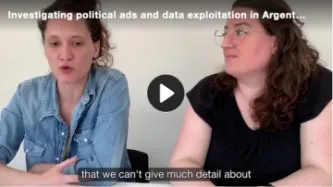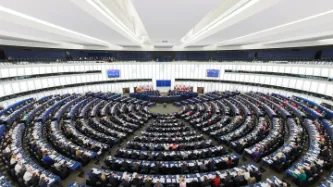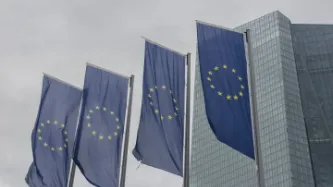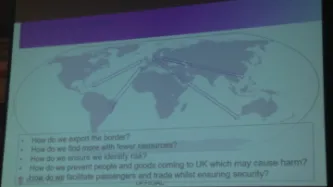Search
Content type: Examples
The Argentinian startup Nippy offers delivery drivers access to rest stops including free coffee, phone charging stations, and toilets in return for downloading its app and allowing it to sell the data the app collects to partners in insurance, financial services, and telecommunications. The result is to give companies like Mastercard and Movistar insight into gig workers' income in the areas where Nippy operates in Argentina, Mexico, and the Dominican Republic. The services Nippy's rest stops…
Content type: Examples
Data-driven wellbeing audits are becoming common in classrooms in Denmark, which has long invested heavily in digital teaching aids and interactive learning. In the last few decades, depression among Danish children has sextupled, and a quarter of ninth-graders report having attempted self-harm. Platforms such as Woof offer teachers regular feedback based on anonymous self-reports. Similar systems in the US extend to surveilling students' emails, chat, and searches.Experts are concerned that…
Content type: Examples
The rise of hybrid work has led to a rise in "bossware": increasingly intrusive technology that monitors employees, tracks their locations, and watches or listens to office workers via cameras and microphones. 90% of such systems can give employers a list of everything a worker has done that day. The cost of such systems has dropped, as has employer trust in staff. The increasing surveillance, now with AI predictive functions, threatens job security and increases the power companies have over…
Content type: Advocacy
Privacy International responded to the consultation on the proposed data protection bill (the "Bill") to reform the current law 25.326
We welcome the continued efforts by Argentina to provide protections for the right to privacy, already enshrined in the Constitution of Argentina. PI welcomes the main objective of the Bill, namely to regulate the processing of personal data in order to guarantee fully the exercise of data subjects’ rights in accordance with Article 43 of the Constitution (…
Content type: Long Read
Content type: Examples
EU health commissioner Stella Kyriakides told health ministers in late May that they could not count on immunity certification when lifting cross-border travel restrictions within the EU. Prevention measures such as physical distancing, robust testing strategies, and ensuring health care capacity were more important. Contact tracing apps might help, but would need to be interoperable.
https://www.politico.com/news/2020/05/25/european-union-commissioner-coronavirus-immunity-certificates-arent-…
Content type: Video
The incorporation of new technologies to electoral processes is a phenomenon with a global and exponential growth. Despite its benefits, online campaigning is not without challenges, and can pose threats to transparency and equity in electoral competition. Given the role of elections as foundational pillars of the democratic system and a key gateway for the exercise of fundamental civil rights, these implications must be assessed with care and through specific tools.
We at PI, together…
Content type: Advocacy
To the Members of the European Parliament and to the Committee on Budgets of the European Parliament
The EU urgently needs to step up and provide assistance to protect the health and safety of people trapped in camps on the Greek islands - not just to protect their welfare, but to contain the virus itself as a matter of global public health.
However, as we detail in the briefing below, the current European Commission proposal for funds allocation is insufficient to ensure the safety of…
Content type: Examples
The former Big Brother reality TV star Matías Schrank was arrested by the Cybercrime division of the Misiones provincial police, after publishing tweets that claimed that Eduardo Rovira, the president of the Misiones legislature, had contracted COVID-19 on his recent trip to Thailand and was reckless in not immediately going into quarantine but continuing to hold meetings with other high-level government officials. Schrank was charged under Article. 211 of the Criminal Code, which…
Content type: Examples
The Argentinian company Urbetrack is developing a "Cuidate en casa" (Take Care of Yourself at Home) app that it will pitch to government agencies throughout the country. The goal is to contribute to remediating the health crisis by helping enforce quarantine. The plan is that users will download the app and complete a form with their personal details as chosen by the local authority. The app will then generate a "radial geofence" defined by the local authority, within which the user must stay.…
Content type: Examples
The Argentinian Ministry of Transport, working with the state-owned satellite company ARSAT and the telecoms regulator,ENACOM, proposed to the Executive on 31 March 2020 a platform that uses cell tower data to track people on public transport and ensure they comply with quarantine laws. By 28 March, the Ministry of Security had detained 13,006 people for violating the rules. The government believes that although compliance is high, it will deteriorate if quarantine is extended much longer…
Content type: Examples
The San Francisco-based big data company Grandata has created a heat map to show which areas of Argentina are best complying with the quarantine lockdown. Grandata used an "anonymised" dataset collected from apps that provide third parties with geolocation information. The heat map shows if an individual has moved more than 100 meters from the place where they spend most of their time, apparently without taking into account the socio-economic contexts of different cities, where individuals…
Content type: Examples
8 europeans telecoms providers (Vodafone, Deutsche Telekom, Orange,Telefonica, Telecom Italia , Telenor, Telia and A1 Telekom Austria) have agreed to share mobile phone location data with the European Commission to track the spread of the coronavirus.
The Commission said it would use anonymsed data and aggregated mobile phone location to coordinate the tracking of the virus spread. They also announced the data would be deleted after the crisis.
Source: https://www.reuters.com/article/us-…
Content type: Examples
The European Commission urged Europe's telecoms giants, including Deutsche Telekom and Orange, to share their users' mobile data streams from across the region to help predict the spread of the coronavirus "for the common good". In a letter in response, Dutch Renew MEP Sophie In't Veld stressed that that data must remain anonymised, and questioned the usefulness of aggregating very large quantities of location data from millions of Europeans who are locked down. Meanwhile, questions are being…
Content type: Examples
Argentina's Public Prosecutor's Office will start installing an app on the smartphones of those who violate government-ordered quarantine in the cities of Santa Fé and Rosario. The app will be installed by the province's Criminal Investigation Agency to track those who are under criminal investigation for violating quarantine. The app will send reports to the the MPA investigation office and coordinated by the Attorney General's Office. Individuals will be required to sign a document…
Content type: Examples
On March 23, Argentina's immigration agency, Dirección Nacional de Migraciones (DNM), announced that anyone arriving in the country would be required to install the free COVID-19 Ministry of Health app on their phone for 14 days to ensure they comply with quarantine rules in order to protect the population. The Office of the Chief of Staff had instructed the DNM to adopt this policy when it launched the app, also on March 23. Since launch, the number of unnecessary permissions the app requests…
Content type: Examples
The self-testing web app issued by Argentina's Secretariat of Public Innovation asks for national ID number, email and phone as mandatory fields in order to submit the test. The Android version requires numerous permissions: calendar, contacts, geolocation data (both network-based and GPS), microphone, camera, full network access; change audio settings, run at startup; draw over other apps, prevent device from sleeping.
Sources:
https://www.argentina.gob.ar/coronavirus/app
https://play.…
Content type: Examples
The free app Testeate, developed by the company Adrómeda in collaboration with the Association of Information and Communication Technologies of Mar del Plata (ATICMA) and the Chamber of Software and Computer Services Companies of Argentina (CESSI) and launched in the Municipality of General Pueyrredón on March 26, is intended to enable direct information exchange between Argentina's National Ministry of Health and the population by offering constantly updated information in any city and…
Content type: Examples
A group of independent developers in Argentina started CoTrack, a public crowdsourced effort to develop an app to track and slow the spread of the virus. CoTrack registers each user's geographic movements and looks for times when they are close to people who have been diagnosed with COVID-19. When there is a confirmed case, a user who has the app can share their data with the community so others can automatically be notified that they should take precautions. The Ministry of Health for the area…
Content type: Examples
An Argentinian crowdsourcing website is collecting information on flights with passengers who were reported as testing positive for COVID-19. Users are asked to enter their email address and the date, airline, and flight number, and tick a box to indicate that someone on their flight was infected. No information is provided on who operates the site, but the terms and conditions indicate that it uses open data flows alongside the collected data.
Source: http://www.checkmyvirusrisk.com/CO/…
Content type: News & Analysis
Photo: The European Union
On 2 September 2019, Privacy International, together with 60 other organisations, signed an open letter to the European Parliament to express our deep concern about upcoming EU policy proposals which undermine the EU’s founding values of human rights, peace and disarmament.
Since 2017, the EU has diverted funds towards security research and security capacity-building in countries around the world. The proposal for the EU's next budget (2021-2027) will…
Content type: Examples
In September 2018, EU’s antitrust watchdog, the European Commission, launched a preliminary investigation into how the platform uses data about merchants. Margrethe Vestager, EU Competition Commissioner said that the informal probe concerns the e-commerce group’s dual role as a competitor while simultaneously acting as a host to third-party merchants, who sell goods on Amazon’s websites. “The question here is about the data,” Ms. Vestager said.
The Amazon marketplace investigation follows up…
Content type: Press release
The Irish Data Protection Commission has today launched an inquiry into the data practices of ad-tech company Quantcast, a major player in the online tracking industry. PI's 2018 investigation and subsequent submission to the Irish DPC showed how the company is systematically collecting and exploiting people's data in ways people are unaware of. PI also investigated and complained about Acxiom, Criteo, Experian, Equifax, Oracle, and Tapad.
PI welcomes this announcement and its focus on…
Content type: News & Analysis
This piece was first published in GDPR today in March 2019.
Elections, referendums and political campaigns around the world are becoming ever more sophisticated data operations. This raises questions about the political use and abuse of personal data. With the European Union elections fast approaching and numerous national and local elections taking place across EU Member States, it is essential that the legal frameworks intended to protect our personal data do just that.
Member State…
Content type: News & Analysis
Photo by DAVID ILIFF. License: CC-BY-SA 3.0
Between 23 and 26 May 2019 Europeans will be voting to elect members of the European Parliament.
Since the last elections in 2014, much has changed within and without the European Union: the rise of nationalism and Euroscepticism, the protracted armed conflict in Ukraine and the occupation of Crimea by Russia, the new political orientation of the United States, just to name a few.
Among the new challenges facing these elections is…
Content type: Long Read
This image was found here.
Spain is holding a national general election on April 28 (its third in four years). Four weeks later Spaniards will again go to the polls to vote in the European Parliament elections. At Privacy International we are working to investigate and challenge the exploitation of people’s data in the electoral cycle including in political campaigns. This includes looking at the legal frameworks governing the use of data by political parties and their…
Content type: News & Analysis
Mr. Zuckerberg has discovered the usefulness of regulation to protect our personal data. After years of lobbying against the adoption of the EU General Data Protection Regulation (GDPR) and of lamenting the ills of its implementation, Facebook seems ready to embrace European data protection law and even spread it across the world. Similar sentiments were recently expressed by Twitter.
This is a welcome change. Maybe the fines recently imposed by regulators and the increased scrutiny of…
Content type: Examples
In January 2019, Facebook announced it would extend some of the rules and transparency tools it developed for political advertising for upcoming spring elections in Nigeria, Ukraine, India, and the EU. In Nigeria, the site will bar electoral ads from advertisers outside the country where the election is being held, build a searchable library of electoral ads and retaining them for seven years, check the identity of individuals buying political ads against government-issued documents, and…
Content type: Examples
In the run-up to the May 2019 European Parliament elections, Google announced it would launch a new set of transparency tools to combat voter manipulation. Before being allowed to buy advertising on Google platforms, campaigns will be required to verify their identity, and approved ads will be required to display the identity of their purchaser. Google will build a real-time searchable database of all political ads and show their purchasers, costs, and demographics. Facebook announced similar…
Content type: Long Read
The UK border authority is using money ring-fenced for aid to train, finance, and provide equipment to foreign border control agencies in a bid to “export the border” to countries around the world.
Under the UK Border Force’s “Project Hunter”, the agency works with foreign security authorities to bolster their “border intelligence and targeting” capabilities with UK know-how and equipment.
As well as the provision of equipment and training, the Border Force is also advising countries on…












